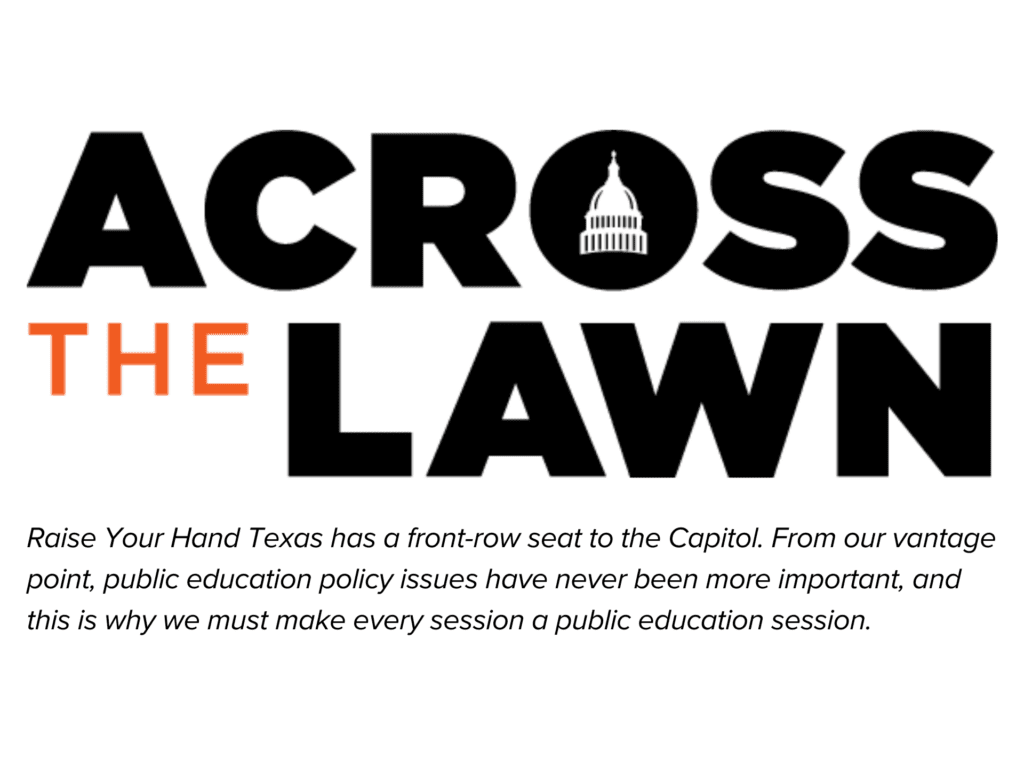
categories
Across the Lawn – May 9, 2025

May 09, 2025

One Thing to Do: Contact Your Legislator
To learn more, watch Dr. Libby Cohen share more about the urgency and why your voice matters!
Our Call to Action for House Bill 2 (HB 2) – the school funding bill – is live. Now is the time to contact your legislators, and one simple click below (and then one more to hit send) is all that you have to do!
Four Things to Know:
1. What to Expect in the Remaining 23 Days of the Legislative Session
With only a few weeks remaining in the 89th Texas Legislative Session, the final decisions for major public education policy changes are still uncertain. Budget conferees continue to negotiate the Texas Education Agency (TEA) budget, as both chambers try to advance legislation on key issues. These issues include school funding formulas, special education allotments, early math and literacy programs, parental and teacher rights, and much more.
Governor Abbott signed the state’s new voucher program into law last Saturday, May 3, marking a major policy shift in the state. The $1 billion Education Savings Account program will begin at the start of the 2026-27 school year.
Meanwhile, HB 2, the House’s $7.7 billion school funding package, which includes a $395 per-ADA increase to the basic allotment, special education funding allotment changes, increased funding for small- and mid-sized schools, and an array of other programs and funding provisions, will likely be heard in the Senate Committee Education K-16 next week. The House’s 131-page bill will most likely change as the Senate substitutes its priorities into the bill, including provisions for a teacher pay increase based on the size of the school district and years of teaching experience.
On the issue of property tax relief, the Senate’s proposal to raise the homestead exemption from $100,000 to $140,000 appears to be the approach the Legislature will take this session. The plan also includes increasing the age 65 and older exemption from $10,000 to $60,000, and expanding the business personal property tax exemption from $2,500 to $125,000. In total, ongoing property tax relief since 2019, including these new provisions, will cost the state over $51 billion in the next biennium.
There also appears to be clear support for early literacy and math efforts by both chambers on K-3 assessments and scaling up TEA-supported teacher academies focused on foundational skills. The House passed its version of this legislation earlier in the week.
Proposals to overhaul the state’s testing and accountability system are also gaining attention. These include replacing STAAR with a series of through-year assessments designed to provide quicker feedback and better track student growth based on a nationally normed-referenced test.
Other high-profile issues still in play include legislation to expand parental rights over curriculum and library content, as well as a proposed Teacher Bill of Rights aimed at student discipline and addressing teacher recruitment and retention challenges. There are also bills that place additional restrictions on school district bonds and tax rate elections, a proposal to ban student cell phone use during instructional time, and a bill to provide additional funding for school safety.
Please stay tuned for more information on these and more issues as the clock continues to count down to the end of the 89th Legislative Session.
2. House Passes Math and Literacy Academies Legislation, HB 123 by Rep. Dutton
On Tuesday, May 6, the House passed House Bill 123 by Rep. Dutton related to measures to support kindergarten readiness and early literacy and numeracy skills for public school students and funding to support those measures. The bill’s cost over the next two years will be $314 million and has the following major provisions:
- TEA Evaluation of Academies: Requires TEA to evaluate the effectiveness of literacy and math academies on teaching practices and student outcomes.
- Assessment Instruments: The TEA Commissioner must adopt and regularly update a list of approved K–3 reading and math assessments, allowing districts to submit tools for approval. These assessments may not be used for public school accountability purposes in grades K-2.
- Intervention Academies: The TEA Commissioner must create and offer reading and math intervention academies for educators working with students needing foundational skills support.
- Literacy Intervention Program: Creates a program for at-risk students with TEA-approved, low-cost or free reading intervention products.
- Vocabulary Pilot: Launches a pilot program to assess K–3 vocabulary development with an adaptive assessment.
- K–8 Math Training Requirement: By 2031–32, all K–3 math teachers and relevant campus staff must attend a math achievement academy. TEA will assist and report on progress. Note: Rep. Ashby’s floor amendment limited academies to grades K-3 vs the original grade K-8.
- Tutoring Grants: Provides $400 grants to eligible K–3 students for TEA-approved reading tutoring services.
- Extended Instruction Time: Adjusts ADA funding for districts offering up to 30 extra days of half-day reading instruction for eligible students.
- Early Education Allotment: Amends FSP to give a 0.01 Basic Allotment multiplier for all K–3 students.
- Early Literacy Intervention Allotment: Establishes a $250 (or greater) allotment per student receiving interventions, capped at 15% of K–3. enrollment; excludes students already funded under the dyslexia allotment.
- Grant Recovery and Funding Reduction: Beginning in 2031, TEA must reduce a district’s FSP entitlement if a student used a tutoring grant but did not show improvement. Unused funds revert to the Foundation School Fund.
- SPED Adjustment: An additional $200 entitlement reduction applies for students with special education needs who received tutoring grants.
3. House Committee on Public Education Hears SB 27 on Teacher Workforce
Senate Bill 27 (SB 27) by Sen. Creighton was heard in the House Committee on Public Education on Tuesday, May 6. The legislation has several provisions related to teacher contracts. The bill also waives initial certification and exam fees for high-need areas like bilingual and special education and allows candidates to retake only failed sections of the bilingual proficiency test.
The bill creates a reimbursement grant for districts that hire retired teachers, easing TRS (Teacher Retirement System)-related cost burdens. It directs the Texas Education Agency to provide training, technical assistance, and grants for teacher recruitment and retention efforts, including grow-your-own pathways and workload reduction strategies.
Teachers are also given more authority to remove disruptive students from the classroom, with safeguards ensuring students are not returned without teacher approval or a formal reintegration plan. Additional provisions require TEA to collect detailed vacancy data, safeguard educators during complaint processes, and ensure prompt campus-wide notification of threats.
4. SB 13 on School Library Books Heard in House Committee
Senate Bill 13 by Sen. Paxton was also heard in the House Committee on Public Education on Tuesday, May 6. The bill allows parents access to library records and the ability to restrict their child’s access to specific titles. The bill has the following provisions:
- Requires districts to comply with new standards beginning in the 2025–26 school year.
- Provides parents access to online catalogs, detailed records of library checkouts, and mechanisms to block access to certain materials outside the school library.
- Creates local school library advisory councils to ensure library content aligns with community values, and must include a majority of parents not employed by the district.
- Mandates that districts adopt a formal policy for acquiring or accepting donated library materials, with a 30-day public review period before approval.



